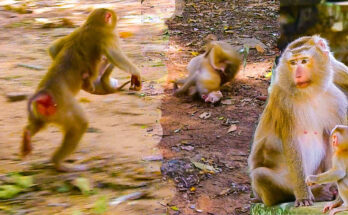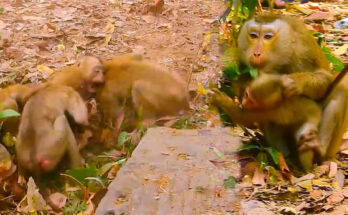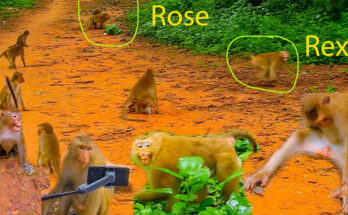Drowning Baby Monkey! But No Help Because Mom Is Just Too Far Away
Deep in the heart of the jungle, where life thrives in an endless cycle of survival and struggle, a heartbreaking moment unfolded by the banks of a fast-flowing river. A baby monkey, barely old enough to climb trees confidently, found itself in grave danger—helpless, struggling, and sinking into the murky water.
It all started as a playful adventure. The young monkey had been hopping along the rocks near the river, enjoying the warmth of the morning sun. It was still learning the ways of the wild, following the example of its mother and the rest of its troop. However, curiosity is a double-edged sword. In its innocent exploration, the baby slipped. The rock, slick from the mist of the river, offered no grip, and in an instant, the tiny creature tumbled into the water.
A sharp, panicked cry echoed through the jungle canopy. Birds flapped their wings in alarm, and the rustling of leaves signaled that other animals had taken notice. But for the baby monkey, no one was coming to help.
The current was stronger than its tiny limbs could fight against. The monkey flailed, its small hands breaking the surface of the water, reaching for something—anything—to hold onto. Its tiny face, filled with sheer terror, bobbed up and down as it gasped for air. It screamed again, a desperate plea that sent chills through anyone who could understand its anguish.
But its mother was too far away.
She had been foraging a short distance away, her attention locked onto finding food for herself and her offspring. The jungle was a dangerous place, and she had learned to always be on alert. Yet, in the split second when the baby had ventured too close to the water, she had not noticed.
Now, she heard the cries. Instantly, her head snapped up, her body tensed, and her maternal instincts took over. Without hesitation, she bolted toward the riverbank, leaping from branch to branch with breathtaking speed. Other monkeys in the troop watched with wide eyes, aware of the tragedy unfolding before them.
But nature can be cruel.
By the time the mother arrived, she was faced with an agonizing sight—her baby, barely visible, being pulled farther away by the current. Her eyes darted around, searching for a way to reach it. But the river was wide, the water raging after recent rains. She hesitated for only a second, calculating the risk.
A mother’s love is powerful, but even that has limits against the merciless forces of nature.
She let out a distressed scream, her hands gripping the tree trunk so tightly that her fingers dug into the bark. She watched, powerless, as her child struggled against the water. The baby, exhausted, could no longer fight. Its tiny body weakened, and with one last desperate cry, it disappeared beneath the surface.
Silence fell.
The mother monkey stared, frozen in shock. Then, a sound erupted from her throat—a deep, sorrowful wail that echoed through the jungle, a cry of loss that no words could ever describe. The other monkeys in the troop remained still, their usual chatter and movement halted by the weight of the moment.
The jungle moved on. The river continued to flow, the birds resumed their songs, and the leaves rustled in the wind. But for one mother monkey, life had just changed forever.
The tragedy of the wild is that it does not stop for grief. There are no funerals, no spoken condolences—only the quiet understanding that loss is as much a part of existence as birth itself.
And yet, the mother would continue. She would grieve in her own way, but soon she would be forced to move on. Survival demanded it. But in the depths of her being, she would always remember the cries of her baby, the helplessness she felt, and the sight of the river carrying away the one she loved the most.
The jungle had claimed another life. And it would not be the last.


